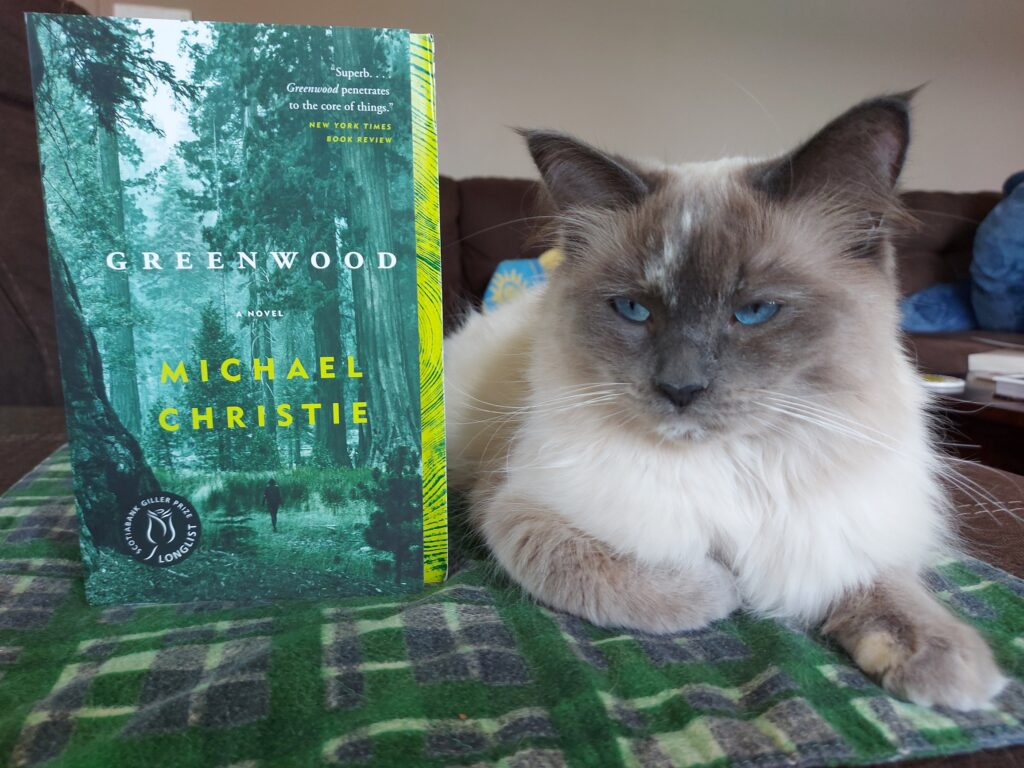Greenwood by Michael Christie

Michael Christie’s Greenwood made CBC’s Canada Reads 2023 shortlist, which I thought was interesting as it was published in 2019. It is exciting when a great book comes unexpectedly out of nowhere. I don’t think I would have ever come across this novel if it had not made this year’s Canada Reads, and I am so glad it did, even though it did not win the top prize. Greenwood is a compelling story about humankind’s relationships with other humans, and humankind’s relationships with trees. It is a novel about the terrifying future of climate change, but it is also a novel about hope and faith in human resilience.
What I appreciate the most about Greenwood is its narrative structure. Like the annual growth rings of a tree, the story begins at its outer circle in the year 2038 and works its way back in time to the core of the story in 1910, before working its way forward in time back to 2038.
In 2038, the Withering has killed off most of earth’s trees, leaving those unfortunate enough to be poor choking to death on the dust that covers the planet as a result, reminiscent of the Dust Bowl during the Great Depression in the 1930s. Canada is one of the few places left on earth that still has most of its trees, and therefore Canada has become an ideal place for the world’s wealthiest people to immigrate to.
Jacinda “Jake” Greenwood, who is nearly bankrupted by her expensive education to become a dendrologist, clings tenuously to her job as a tour guide at the Greenwood Arboreal Cathedral, located on Greenwood Island off the coast of British Columbia. The Greenwood Arboreal Cathedral is an eco-tourist site where the ultra-rich get to commune with old growth Douglas firs that have not been killed off in the Withering, yet. Jake thinks that her surname, Greenwood, is coincidental to the Greenwood Arboreal Cathedral. All she knows of her dad, Liam Greenwood, whom she never met, is that he was a carpenter who built things for the rich with reclaimed wood, and he died in 2008 on a job site. Liam’s mother, though, was Willow Greenwood, a hippy fighting for environmental rights who in 1974 inherited her father’s fortune, which included Greenwood Island, and she promptly gave it all away to environmental causes. Willow’s father, Harris Greenwood, had built his fortune through logging, and acquired Greenwood Island in 1934. The bulk of Greenwood is spent in 1934 following Everett Greenwood’s (Harris’s brother) cross-Canada journey from New Brunswick to Vancouver after finding an abandoned infant and being pursued by the terrible men who want her back.
One day in 2038, Jake’s ex-fiancé, a lawyer, shows up at Greenwood Island to tell her that she may have a claim on Greenwood Island, not through the Greenwood family, but through the Holt family who founded the company that owns the Greenwood Arboreal Cathedral. What unfolds from there is an intriguing story about the origin of the Greenwood family. Much is made about the concept of the family tree and tracing one’s biological ancestors, but Greenwood is about the families that are created out of circumstance and bound together by love, lies, sacrifice and obligation.
Each of the Greenwoods reflects their generation’s attitude towards nature. Harris’s generation is the one that raped and pillaged nature in order to make their fortunes. Willow’s generation is one that rebelled against their parents and was trying to save the world long before Greta Thunberg was even born. Liam’s generation is the one that can see the beauty in nature but is otherwise ambivalent about trying to do anything about climate change. Jake’s generation is the one that will suffer the most from the future effects of climate change. Climate change is inevitable as not much is being done about it now, but Greenwood is hopeful that humankind will persevere through climate change as we have always persevered when things seem to be at their worst.